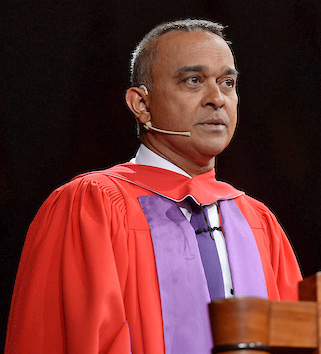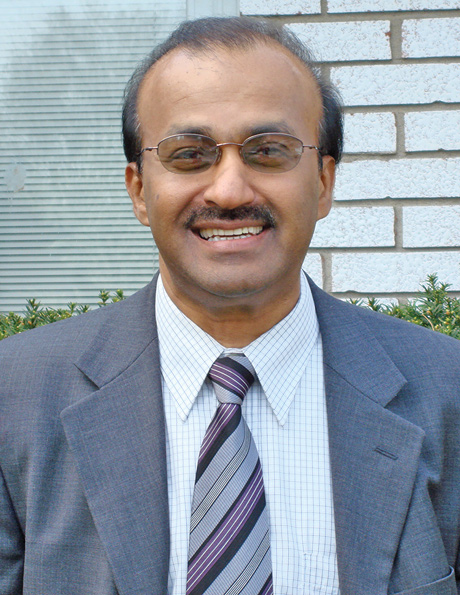Toronto – On June 18, Schulich alumnus and physician Dr. Narendra Singh received an Honorary Doctor of Laws during the Spring Convocation ceremony.
Singh, who was Chief of Staff at Humber River Hospital, devoted his career as a physician to global pediatric and neonatal health care. He recently retired to focus on the initiative that he founded in 2009 – Guyana Help the Kids (GHTK). This sustainable and comprehensive program has drastically reduced infant mortality rate and improved Guyana’s access to basic prenatal care.
The honorary degree was conferred before graduands in the Faculty of Health, including students belonging to the first cohort to graduate from York’s Global Health program.
“It is a marvelous synergy that someone with such an outstanding body of work in global health is here as we celebrate our first graduates of the global health program,” said York University Chancellor Greg Sorbara of Singh.
“I’m receiving this Honorary Doctor of Laws, but I’m somewhat conflicted since my success is the combined effort of many people, some in the audience today, and so I would like to share this degree with them,” said Singh.
Musing over how to inspire a generation in the age of advanced technology, with “everything at their fingertips,” Singh chose to focus on what he learned from a long life and career.
He highlighted the importance of family and giving back, and spoke of personal qualities that drive success, such as good interpersonal skills and humility. He reminded graduands to let their accomplishments speak for themselves.
Two guarantees in life, he suggested, are that everyone will experience good times and bad times. He then asked the graudands “when adversity strikes, and it will strike, my question to you is, who will be there?”
He spoke of his own support from his parents, and how after completing specialty medical training he was offered an exciting job in the United States, but took a less exciting opportunity closer to home in Ontario to be near his parents and two brothers.
Though his career could have taken a drastically different turn had he accepted the job in the U.S., he believes he still did well, and attributes his success to putting family over career.
“I will say to you unequivocally: your career will flourish if you’re happy and surrounded by loved ones like you are today,” he told graduands, urging those who don’t have the same fortune of nearby family to find and build their families.
“We are all connected and the stronger and healthier our relationships are, the more grounded, resilient and, ultimately, successful we can be,” he said.
He recalled as a child in Guyana, at age six or seven, being one of the lowest ranked students in the class. Remembering the support of his family and how he did initially struggle, he also recalled that with hard work, his grades began to improve.
“My point is that when you look at people who have done really well, finally, in their lives, their grades don’t necessarily explain all of it,” he said.
Singh also urged graduands to let their accomplishments speak for themselves.
“Consider team success, not personal success; sing the praises of others, not your own,” he said.
Giving back is also a driver toward success, said Singh, who runs GHTK to save the lives of infants.
“Being successful also means helping others to achieve their success … so make sure that you leave room in your life for giving back,” Singh said.
And, while making a big contribution is important, Singh circled back to the sentiment that family is the stepping stone to a happy, fulfilling and successful life.
“Give first to your family with your time and attention. You only have one chance. Invest in your family, hone your skills and wait for the right time to do the big things,” he said.
In his address, Singh noted that he was, not too long ago, sitting among students when he recently graduated from the Schulich/Kellogg Executive MBA Program.
He commended the program, Dean Dezsö J. Horváth and faculty for making it the number one executive MBA program in Canada and noted the program’s global high ranking.
In addition to leading Guyana Help the Kids, Singh is also a consultant pediatric intensivist at Doctors Hospital of Renaissance in Texas. He has received numerous awards including the Meritorious Service Medal of Canada, the Royal College of Physicians and Surgeons Award “Prix de Excellence/Specialist of the Year” and the Professionalism Award from the Government of Guyana.
|
The grim reaper, as everyone knows, comes for everyone. However, when death is sudden and unexpected, it is relatively harder to accept. Much more so when someone who was not known to have any medical ailment or who doesn’t indulge in what doctors call bad choices: drinking, smoking or gluttony, is snatched from you.
That’s the case of Dr. V. Chris Lakhan who passed away peacefully on June 12, 2018 at the youthful age of 67, leaving a void in the lives of his mother and eight surviving siblings, as well as the thousands of those he touched over his lifetime.
Born in Fyrish Village on the Corentyne Coast of Guyana on July 8, 1951, Chris was a brilliant “son of the soil” who rose from humble beginnings to become an outstanding academic, educator, mentor and world renowned scientist.
In fact, he was recognized by the International Biographical Research Center in Cambridge, England as one of the top 2,000 outstanding scientists of the 21st century.
A relatively simple individual who never craved attention, Chris’ standing in the academic world was derived from his rather complex work in earth and environmental sciences, which the average individual would care little about, but which had a tremendous impact on national development, industrial initiatives, environmental protection, coastal structures, natural resource development, climate change, and many other related applications.
His research focused on the development of computer simulation models, and the use of Geographical Information Systems (GIS) and remote sensing techniques to study and predict the dynamics at work in coastal and other natural environmental systems.
The models he developed are used to forecast climate change and predict its effects in any environment; conduct carbon, energy and environmental audits and assessments; perform optimal site selection for the location of resource-based activities such as mining, agricultural, forestry, hydrological, and energy installations, as well as commercial, industrial and social structures.
During his early years, Chris attended the Fyrish Congregational School where he passed the College of Preceptors Examination at the tender age of 13. Two years later, he was one of few Guyanese students who passed the University of London General Certificate of Education (GCE) Examinations while still in primary school. Then, the GCE examinations were written primarily by high school students.
He subsequently became a pupil teacher at his alma mater primary school before heading off to the University of Guyana (UG) to pursue an undergraduate degree in Geography. While attending UG part time, he was a teacher at the Cummings Lodge Primary School on the East Coast of Demerara.
Upon graduation from UG in 1973, he was awarded the John Bartholomew of Scotland Geography Award for the Best Graduating Student. After serving as a teaching assistant at the University of Guyana for one year, Chris received a Canadian Commonwealth Scholarship but chose to accept a Graduate Scholarship from the University of Windsor, Ontario to pursue a Master's degree in Geomorphology, which he completed in one year.
Chris subsequently moved to the University of Toronto to pursue doctoral studies and graduated with a PhD in Geomorphology (Earth Sciences) in 1982. While at the University of Toronto, he received Open Fellowships for four consecutive years between 1976 and 1979. He also served as a graduate teaching assistant while completing his doctoral studies.
After working in the private sector as a Chief Systems Scientist for a brief period, Chris returned to the University of Windsor as an Assistant Professor in 1984 in the Department of Geography (now Earth and Environmental Sciences Department), where he remained until his retirement as Professor Emeritus in December 2016.
According to a University of Windsor communique following his death, Chris' teaching career impacted many students through his popular courses in resource management, environmental impact assessment, GIS, and remote sensing, winning him numerous teaching awards. Truly a professor, his passion for teaching never diminished but remained with him until the year of his retirement.
His passion for teaching is demonstrated by him winning the University Of Windsor’s Faculty of Science Highest Teaching Score Award for the 12 consecutive years between 2005 and 2016. His teaching excellence led one of his colleagues to describe him as a “professor’s professor” at his funeral viewing reception.
During his career as a Professor, Chris supervised, co-read, and examined more than 100 undergraduate and graduate theses, including those of many foreign students, as far away as China, Iran and Pakistan, some of whom he continued to mentor in senior roles in their respective countries.
Chris had an extensive record of publications, authoring and or editing eighteen books, including two best-selling books on coastal modelling, published by world-recognized Elsevier Science of the Netherlands. He also authored chapters in 20 books and published articles in dozens of peer-reviewed professional and academic journals. He also made presentations at more than 60 conferences across the globe.
He was either the principal or co-investigator on more than
See page 19: "World renowned..." |



